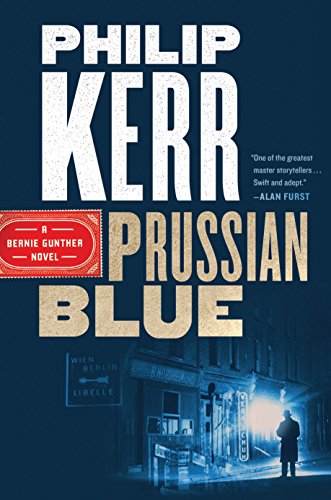
In a series of twelve novels to date, British author Philip Kerr has examined the boundless cruelty and corruption that reigned in Nazi Germany. Kerr has done his research. Top Nazis figure in every one of these novels, and his portraits of them are convincing. His protagonist, Berlin homicide detective Bernie Gunther, is in some ways a standard-issue tough cop like those who populated the crime fiction of the 1930s and 1940s. He’s a big guy who can usually take care of himself in a fight. He’s cynical—what used to be called a “wise guy”—who is prone to run his big mouth far more often than he should. And he repeatedly finds his way to the beds of beautiful women.
But Bernie serves a larger literary purpose. A social democrat who never consented to join the Nazi Party, he’s a foil for the never-ending parade of high-ranking Nazis he meets in the course of his investigations. Bernie isn’t just a non-Nazi; he’s openly anti-Nazi, and he doesn’t care who knows it. Somehow, improbably, he has managed to survive more than two decades in conflict with the Nazi leadership. His consummate skill as a detective saves him every time.
Prussian Blue (Bernie Gunther #12) by Philip Kerr ★★★☆☆
In Prussian Blue, the twelfth novel in the series, the scene shifts back and forth from 1956 to 1939. In ’56, Bernie has been working under a false name as the concierge at the most exclusive hotel on the Riviera. Invited to dinner at another expensive hotel, he finds himself confronting General Erich Mielke, the thoroughly unsavory character who ran the Stasi in Communist East Germany. Mielke threatens to kill Bernie’s estranged wife unless he consents to travel to England and assassinate a Stasi agent there (one of the many women he has bedded).
Top Nazis, stepping out of history, populate this novel
Bernie has done a lot of things, but assassination is out of the question. When he soon afterwards escapes the handlers Mielke has assigned to him, Bernie sets out on a desperate flight by train, automobile, bicycle, and foot in hopes of hiding out in West Germany. The squad of handlers is run by Friedrich Korsch, a former Nazi who had served as Bernie’s assistant on a huge murder case in 1939. Korsch’s reappearance calls up memories of that case, which involved a daisy chain of top Nazi officials. In one flashback after another, we meet Reinhard Heydrich, Martin Bormann, Rudolf Hess, and other top Nazis, including Bormann’s younger brother, Albert. Other key officials, including Adolf Hitler himself, remain behind the curtain, stage right.
All the preceding entries in the Bernie Gunther series speed along at a fast clip, accelerated by surprising bouts of action and Bernie’s nonstop wise-guy banter. The suspense is palpable. The only recurring flaw is that the dialogue is sometimes simply too smooth, witty, and cynical. However, Prussian Blue disappoints for two reasons: Bernie’s flight from the Stasi seems endless and becomes tedious after awhile, and both his dialogue and his private thoughts run on far too long. On several occasions, I found myself getting impatient, wishing for an editor: this book could have been about one-third shorter. It’s still worth reading for the historical perspective on the Nazi leadership.
For related reading
For links to reviews of the whole series, go to Philip Kerr’s Bernie Gunther novels.
My post The 10 best novels about World War II may also interest you. So might 10 top nonfiction books about World War II.
You might also enjoy my posts:
- Top 10 mystery and thriller series
- 20 excellent standalone mysteries and thrillers
- 30 outstanding detective series from around the world
- Top 20 suspenseful detective novels
- Top 10 historical mysteries and thrillers
And you can always find my most popular reviews, and the most recent ones, on the Home Page.


























